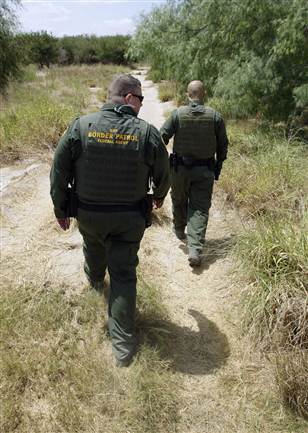 |
| Eric Gay / AP U.S. Customs and Border Patrol agents patrol along the Rio Grande near Wednesday, on June 8, 2011 in Penitas, Texas. Between October 2009 and March 2011, U.S. Border Patrol detained at least 2,600 illegal immigrants from India, a dramatic spike. |
A new mass of humanity is moving across the U.S. border with Mexico. Illegal-alien Indians, many of them Sikhs, are coming to the United States, the Associated Press reported on Sunday, because it elevates their social status back home. They will account for 33 percent of the illegals caught trying to cross the border.
So border officials now contend not only with Mexican revanchists and drug traffickers but also Indians from the Punjab and Gujarat, who are using dangerous smugglers to get them across the border into Texas. According to the AP, an immigration detention center in Texas holds a large number of Sikhs who lie to judges by claiming they are seeking asylum from religious persecution.
The Numbers
The number of Indians flooding Texas is alarming, and shows no signs of abating. “Indians have arrived in droves even as the overall number of illegal immigrants entering the U.S. has dropped dramatically, in large part because of the sluggish American economy,” the AP reported.
Between October 2009 and March 2011, the Border Patrol detained at least 2,600 illegal immigrants from India, a dramatic rise over the typical 150 to 300 arrests per year.The influx has been so pronounced that in May, Homeland Security Secretary Janet Napolitano told a Senate committee that at some point this year, Indians will account for about 1 in 3 non-Mexican illegal immigrants caught in Texas.
Some Indians cough up $20,000 to make the trip, a boon to the smugglers who have fewer Mexicans to transport. The smugglers are, after all, “businessmen,” the AP reported, quoting a border patrol official.
From Asia to Central America
The pipeline begins in Asia, where the Indians are smuggled through locales such as Hong Kong, the AP reported. From there, they land in Central America, then head north through Mexico to cross the border surreptitiously. The Indians have adopted the long and dangerous route, the AP notes, because “U.S. authorities have cracked down on the traditional ways they used to come here, such as entering through airports with student or work visas. The tougher enforcement has made it harder for immigrants to use visas listing non-existent universities or phantom companies.”
As well, Guatemala, El Salvador, Nicaragua, and Honduras changed their visa requirements in 2009 in order to attract investors, permitting Indians to enter without visas.
But the illegal immigration problem from Guatemala to Mexico became so bad that Guatemala reinstated its visa requirement on June 6. “Still, the lack of a visa requirement allowed at least 8,300 Indians to enter Guatemala,”the AP said, “and fewer than 28 percent of them exited legally, according to Enrique Degenhart, director of Guatemalan immigration. The others disappeared to continue heading north.”
Meanwhile, El Salvador, Nicaragua and Honduras still don't require visas for Indians, meaning smugglers can shift routes and use those countries as alternate jumping-off points for the journey north.El Salvador's director of immigration, Ruben Alvarado, said officials have begun quizzing arriving Indians about what Salvadoran tourist sites they intend to visit in an attempt to spot those entering the country simply to head north.
Lying to U.S. Officials
The illegal-alien Indians lie to U.S. officials about their reason for sneaking across the border. Many of the Sikhs say they are fleeing religious persecution or financial insecurity. Yet Punjab and Gujarat, AP reported, “are relatively prosperous and where it’s common for people to seek greater fortunes abroad even if they are financially secure at home.”
An Indian professor, Pramod Kumar, explained that “immigrating to other countries is an important regional tradition that's even reflected in folk songs.”
If people face dire economic straits, “you try and sell your land and go abroad,” Kumar said. “If you’re prosperous, still you go abroad because, culturally, it gives you a higher status.”Many immigrants take jobs driving trucks or taxis or working on farms. Initially, the pay is not substantially greater than they would make back home, but simply living in the West elevates their social standing in India. And over time, their earnings increase, Kumar said.
As well, Sikh authorities control one of the two states from which the illegals are coming, which Kumar said belies the claim that they are fleeing religious persecution. “It’s all nonsense,” he told the AP.

